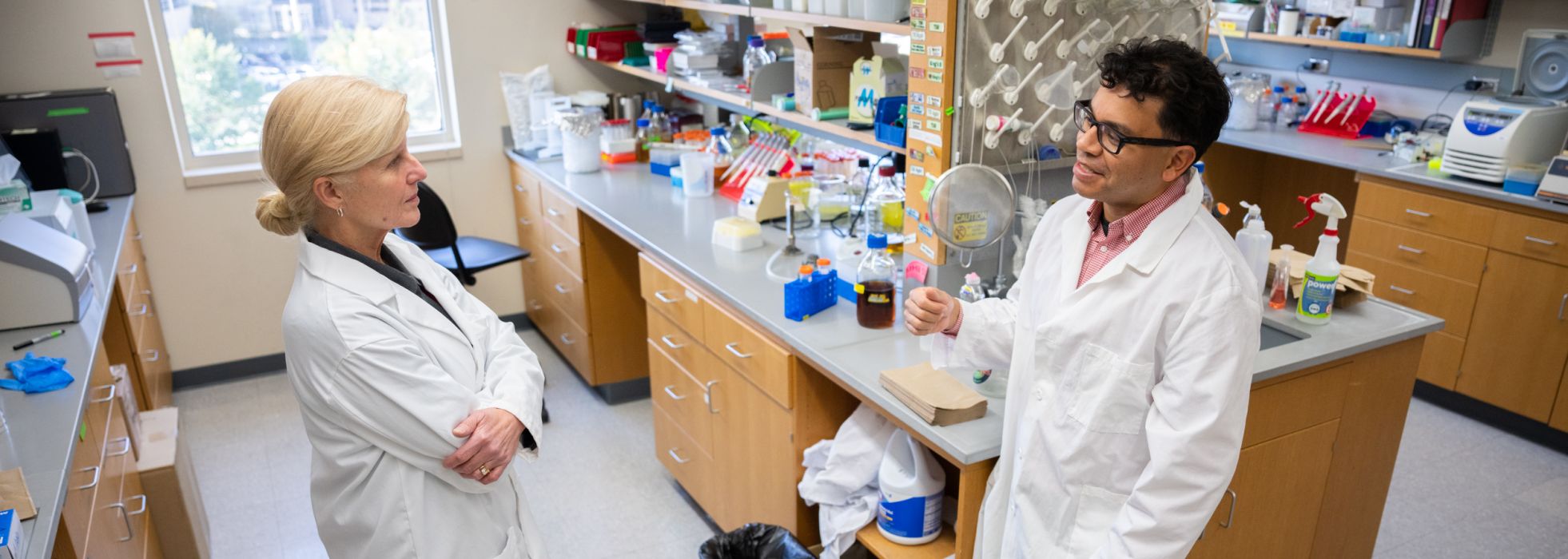Immune Response to Vaccines in Immunosuppressed Patients
Freddy Caldera, DO, PhD (left), is a formally trained clinical investigator, gastroenterologist, and physician scientist who specializes in inflammatory bowel disease (IBD).
Mary S. Hayney, PharmD, MPH (center), is a professor at the University of Wisconsin School of Pharmacy.
Their lab primarily evaluates immune responses to vaccine in patients with inflammatory bowel disease (IBD) to determine if certain patients with IBD disease can benefit from a different immunization schedule than the general population.

Influenza Vaccines
The lab previously found in a randomized clinical trial that the high-dose influenza vaccine induces higher antibodies compared to the standard dose influenza vaccine in immunosuppressed patients with IBD. These results suggest patients with IBD may benefit from receiving a high-dose influenza vaccine.

COVID-19 Vaccines and Beyond
During the COVID-19 pandemic, Drs. Caldera and Hayney launched the "HumoRal and CellULar initial and Sustained immunogenicity in patients with IBD (HERCULES)" clinical trial. They found that patients with IBD are able to mount antibodies and cellular immune response despite being on immunosuppressive therapy.
As new IBD treatments emerge, or new vaccines—such as the RSV vaccine—are approved, the lab aims to evaluate immune response on these new therapies and determine if patients with IBD need a different immunization schedule for new vaccines.
Laboratory Capabilities
Located on the 4th floor of Rennebohm Hall, the Caldera/Hayney lab is is well-equipped for vaccine-induced immune response studies. It has biologic safety cabinets, centrifuges, ultracold freezers, plate readers and other standard lab equipment. Routine assays for the lab include ELISA, ELISPOT, hemagglutination inhibition assay, cell culture and microneutralization.
Active Projects
- Immunogenicity of Herpes Zoster Subunit Vaccine in Inflammatory Bowel Disease Patients Treated With Vedolizumab
The purpose of this study is to determine the immunogenicity of the herpes zoster subunit vaccine in inflammatory bowel disease patients on vedolizumab compared to those on anti-tumor necrosis factor (TNF) monotherapy.
- Additional Recombinant COVID-19 Humoral and Cell-Mediated Immunogenicity in Immunosuppressed Populations
To determine whether providing a recombinant booster COVID-19 vaccine improves sustained humoral and cell-mediated immunogenicity against SARS-CoV-2 in immunosuppressed patients with Inflammatory Bowel Disease (IBD) and/or solid organ transplant recipients. 120 participants will be enrolled and can expect to be on study for 6 months.
- Determining the Relationship Between Gut Microbiota and Immune Response to Influenza Vaccine
This study will evaluate the effect of the microorganisms in the gut on how well the flu vaccine works in people who have a weakened immune system due to inflammatory bowel disease. Participants can expect to be in the study for 1 month.
Funding Support
Dr. Caldera's research is funded by medical society and pharmaceutical industry grants.

